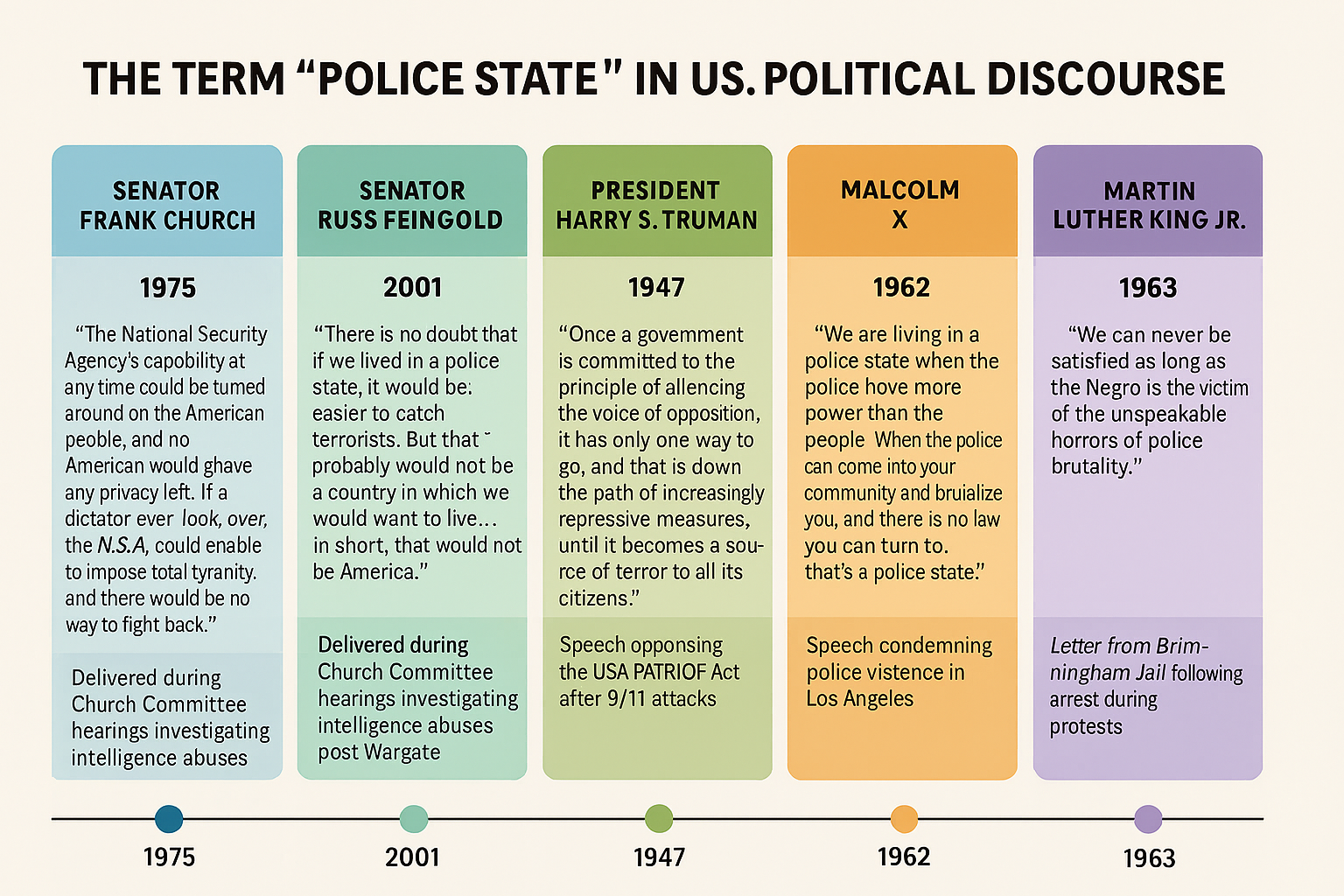Summary
Remember the days when we went to the movie theatre and saw a 15-minute news brief depicting the U.S.A. as the freest country in the world, with he people experiencing freedom while our politicians were dictating something totally different. Looking back at the blurred lines causes a pause. Have we ever experienced freedom from repression, or is that just a convenient illusion by the masters of the universe?
Overview
The phrase “police state” entered American political vocabulary in the early 20th century as a critique of authoritarian regimes abroad, later becoming a domestic warning against government overreach. Its usage surged during periods of perceived threats to civil liberties—wartime, civil rights struggles, and post-9/11 security measures.
Key Speeches and Statements
1 Senator Frank Church (1975) – Church Committee Hearings
Excerpt:
“The National Security Agency’s capability at any time could be turned around on the American people, and no American would have any privacy left, such is the capability to monitor everything: telephone conversations, telegrams, it doesn’t matter. There would be no place to hide. If a dictator ever took over, NSAS.A. could enable it to impose total tyranny, and there would be no way to fight back.”
Context:
- Delivered during Senate hearings investigating intelligence abuses by the CIA, FBI, and NSA after Watergate.
- Church warned that unchecked surveillance could enable a future dictatorship.
- Led to reforms like the Foreign Intelligence Surveillance Act (FISA) of 1978.
2. Senator Russ Feingold (2001) – USA PATRIOT Act Debate
Excerpt:
“There is no doubt that if we lived in a police state, it would be easier to catch terrorists... But that probably would not be a country in which we would want to live. And that would not be a country for which we could, in good conscience, ask our young people to fight and die. In short, that would not be America.”
Context:
- Delivered on 25 October 20011, as the only Senate vote against the PATRIOT Act.
- Warned that sacrificing liberty for security would undermine American values.
- His concerns foreshadowed the NSA surveillance controversies that would later emerge.
3. President Harry S. Truman (1947) – Civil Liberties Address
Excerpt:
“Once a government is committed to the principle of silencing the voice of opposition, it has only one way to go, and that is down the path of increasingly repressive measures, until it becomes a source of terror to all its citizens and creates a country where everyone lives in fear.”
Context:
- Part of Truman’s civil rights advocacy, including his Special Message to Congress on Civil Rights (1948).
- Warned against authoritarian tendencies during the early Cold War.
- Though not using the term “police state,” the sentiment aligns with its meaning.
4 Malcolm X (1962) – Speech on Police Brutality
Excerpt:
“We are living in a police state where the police have more power than the people. When the police can come into your community and brutalize you, and there is no Law you can turn to, that’s a police state.”
Context:
- Delivered after LAPD’s violent raid on Nation of Islam Mosque No. 27 in Los Angeles.
- Highlighted systemic police violence against Black communities.
- Framed racial oppression as a form of domestic authoritarianism.
5. Martin Luther King Jr. (1963) – Letter from Birmingham Jail excerpt (related sentiment):
“We know through painful experience that freedom is never voluntarily given by the oppressor; it must be demanded by the oppressed.”
Context:
- Written after King’s arrest during the Birmingham protests.
- While not using the term “police state,” activists often described Birmingham’s enforcement under Bull Connor as police-state tactics.
- King’s argument for civil disobedience became a cornerstone of civil rights philosophy.
Patterns and Themes
- Wartime & Security Crises: WWII, Cold War, and post-9/11 eras saw spikes in usage.
- Civil Rights Movement: The term became a rallying cry against racialized policing.
- Surveillance State Concerns: From Church Committee to Snowden-era debates, “police state” critiques often center on privacy and government overreach.
✅
